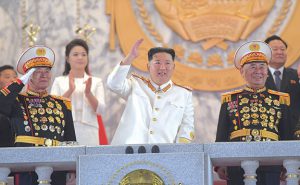Bloomberg
North Korea appears to have fired an intercontinental ballistic missile (ICBM) in a defiant show of force just hours after US President Joe Biden wrapped up a visit to the region, testing his efforts to strengthen defense ties with South Korea and Japan.
South Korea said a suspected ICBM reached an altitude of about 540 kilometres (335 miles) and traveled a distance of about 360 kms. The flight was far shorter than its last ICBM test in March of a missile that reached an altitude of 6,200 kilometres and travelled 1,080 kilometres to splash down in the sea west of Japan.
North Korea also fired two shorter-range missiles including one that flew about 760 kilometres and reached an altitude of 60 kilometres, its Joint Chiefs of Staff said. All three were launched from an area near Pyongyang’s main airport. The launch of an ICBM, designed to carry a nuclear warhead to the US mainland, would be one of the biggest provocations North Korea has conducted to coincide with a visit by a sitting American president to the region.
The White House said Biden was briefed on the launches. The US Indo-Pacific Command said
in a statement, that “while this event does not pose an immediate threat to US personnel or territory, or to our allies, the missile launches highlight the destabilising impact of the DPRK’s illicit weapons program,†referring to North Korea by its formal name.
Kim Jong-un has ignored US appeals to return to the negotiating table, and his regime usually doesn’t comment on what it fired until the next day.
The country is barred from ballistic missile launches by United Nations Security Council resolutions.
“Perhaps Kim judged that remaining silent after Biden’s trip to Asia would have been out of character for North Korea,†said Soo Kim, a policy analyst with the Rand Corp who previously worked at the Central Intelligence Agency.
“In the face of a successful
US-South Korea summit and Washington’s tepidity towards negotiating on Kim’s terms, Kim will continue to show resolve in strengthening and displaying his weapons capabilities,†she said.
Biden and US allies might not have much leverage in trying to slow down the tests or ratchet up global sanctions to punish Pyongyang for its provocations, which could soon include its first nuclear test since 2017. South Korean deputy security adviser Kim Tae-hyo said Seoul has detected signs its neighbor has been operating a detonation device, which indicates an underground nuclear explosion could be near.
The US push to isolate Russia over Vladimir Putin’s war in Ukraine, coupled with increasing animosity toward China, has allowed Kim to strengthen his nuclear deterrent without fear of facing more sanctions at the UN Security Council. There’s almost no chance Russia or China, which have veto power at the council, would support any measures against North Korea, as they did in 2017 following a series of weapons tests that prompted then President Donald Trump to warn of “fire and fury.â€
North Korea has been firing missiles at a record pace this year.
 The Gulf Time Newspaper One of the finest business newspapers in the UAE brought to you by our professional writers and editors.
The Gulf Time Newspaper One of the finest business newspapers in the UAE brought to you by our professional writers and editors.
